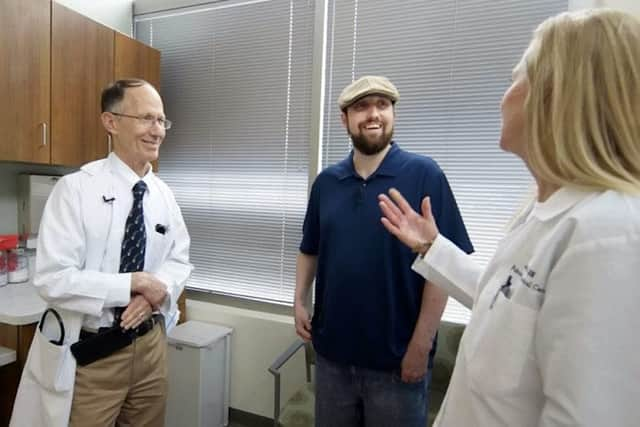New way to treat deadly sepsis infections could be on the horizon
and live on Freeview channel 276
A new way to treat deadly sepsis infections could be on the horizon by revving up a patient's immune system.
Each year there are around 123,000 cases of sepsis in England and it kills around 37,000.
Advertisement
Hide AdAdvertisement
Hide AdAnyone can develop sepsis after an injury or minor infection but people with weakened immune systems, hospitalised for a long time, recovering from surgery or wounds, or are very young or old are most at risk.


Sepsis and its more severe form called septic shock are among the deadliest problems facing patients in intensive care units.
The conditions occur when the body has an extreme response to infection triggering an overwhelming immune response, ultimately wreaking havoc on the immune system.
Until now patients are given high doses of antibiotics to fight the infection but they often don't work well and fail to boost the body's immune defences leaving patients vulnerable to new infections.
Advertisement
Hide AdAdvertisement
Hide AdA small clinical trial led by researchers at Washington University School of Medicine in St. Louis shows that a drug that revs up the immune system holds promise.


This approach goes against the grain of earlier strategies that have relied on antibiotics and inflammatory medications to tamp down the immune system.
Senior investigator Professor Dr Richard Hotchkiss at Washington University explained: "Mortality rates from sepsis have remained essentially the same over the last 50 years.
"Hundreds of drugs have been tried and have failed.
"It may sound counterintuitive when inflammation is such a problem early in sepsis, but our approach is to stimulate certain immune cells to help the patient's system take control of the infection."
Septic shock
Advertisement
Hide AdAdvertisement
Hide AdThe trial involved 27 patients aged 33 to 82 severely ill with septic shock at two hospitals in the US and two in France.
Of theses 17 were given a drug made of interleukin-7 (IL-7) called "the maestro of the immune system" because it enhances the proliferation and survival of two types of immune cells CD4 and CD8.
These cells are important because they recruit other immune cells to fight severe infections that can lead to organ failure and death.
The other ten patients received the standard treatment.
Co-investigator Professor Dr Edward Sherwood of Vanderbilt University Medical Center in Nashville where some were treated said: "Patients who develop the most serious form of sepsis, called septic shock, often have very low counts of these key immune cells
Advertisement
Hide AdAdvertisement
Hide Ad"We believe that could play a role in the development and course of sepsis because without those cells, patients aren't able to clear as much harmful bacteria."
Immunity boost
Those who received the drug experienced a threefold to fourfold increase in CD4 and CD8 counts.
IL-7 boosted the adaptive immunity, in which CD4 and CD8 T cells help recruit other immune cells - called macrophages, monocytes, neutrophils and dendritic cells - to kill bacteria that cause infections.
Prof Hotchkiss said traditional sepsis treatments do not address the critical problem of patients' severely compromised immune systems.
Advertisement
Hide AdAdvertisement
Hide AdWithout restoring immune function, many patients develop lingering infections and are helpless to fight any new infections.
He added: "We know that 40 per cent of patients die in the 30 to 90-day period after the initial septic infection.
"Their bodies can't fight secondary infections, such as the blood infections and staph infections that can develop later on because their immune systems are shot.
"By strengthening adaptive immunity with IL-7 and increasing the numbers of CD4 and CD8 cells available to help fight infections, we think this approach can make a big difference."
Advertisement
Hide AdAdvertisement
Hide AdThe new strategy of using IL-7 to boost the immune system is being tested in cancer patients and other critically ill patients to boost their survival rates.
A larger clinical trial is planned for sepsis patients
The study was published in the journal JCI Insight.